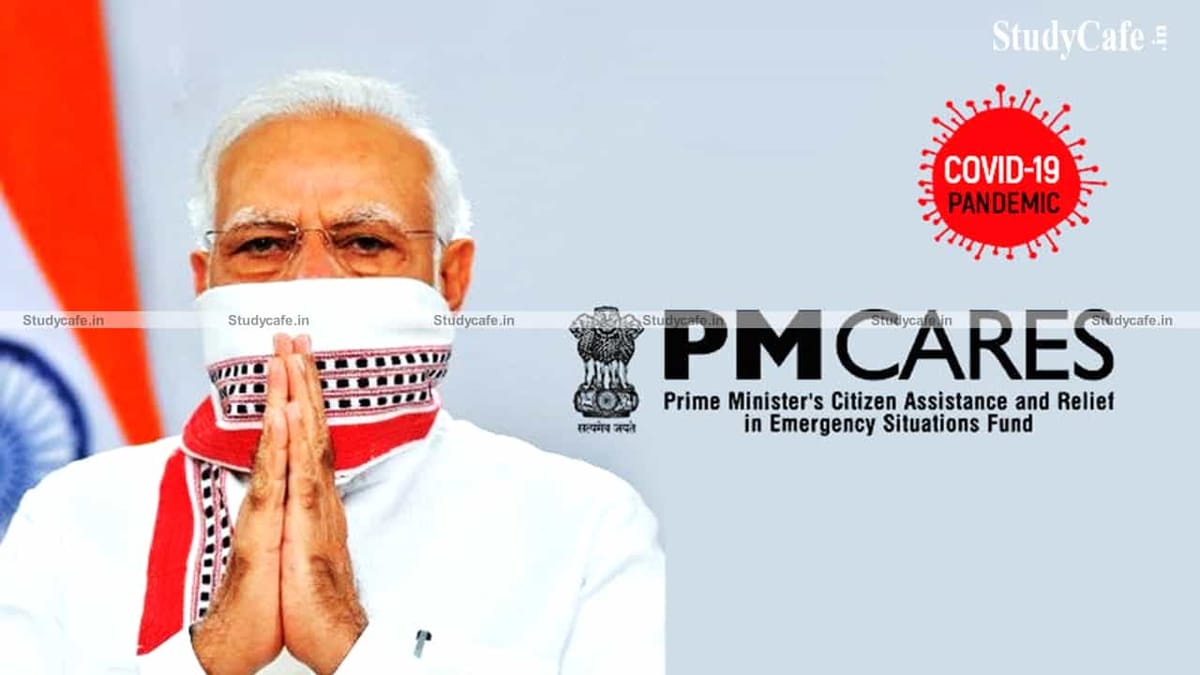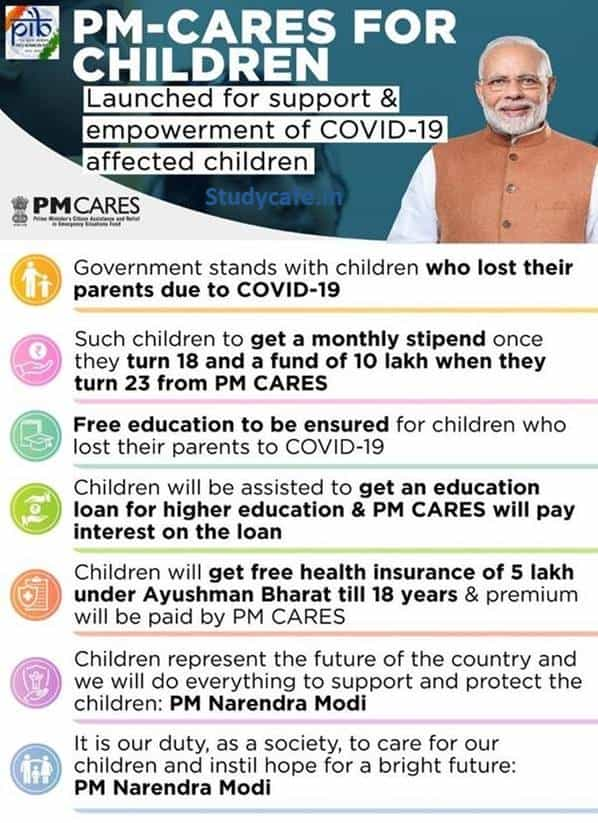Government Issues Guidelines For PM Cares For Children Scheme
Reetu | Oct 7, 2021 |

Government Issues Guidelines For PM Cares For Children Scheme
PM CARES for Children Scheme complete guidelines have been provided by the Ministry of Women and Child Development. Prime Minister Shri Narendra Modi said on May 29, 2021, that children who have lost both parents as a result of the COVID 19 pandemic will receive complete assistance. The scheme‘s goal is to provide long-term care and protection for children whose parent(s) died as a result of the COVID pandemic, as well as to enable their well-being through health insurance, empower them through education, and equip them for self-sufficiency with financial assistance once they reach the age of 23.
The PM CARES for Children Scheme, among other things, provides support to these children through a convergent strategy, gap funding for schooling and health, a monthly stipend starting at the age of 18, and a lump sum payout of Rs. 10 lakh when they reach the age of 23.
To take advantage of the PM CARES for Children Scheme, eligible children must enroll between May 29, 2021, the date of the Prime Minister’s announcement, and December 31, 2021. The Scheme is expected to run until each identified recipient reaches the age of 23 years old.
All children who have lost i) both parents or ii) a surviving parent or iii) a legal guardian/adoptive parents/single adoptive parent due to the COVID 19 pandemic will be eligible for benefits under this scheme starting on 11.03.2020, the date on which WHO declared and characterised COVID-19 as pandemic, until 31.12.2021, will be eligible for benefits under this scheme. iv) At the time of the parents’ death, the child should not have reached the age of eighteen.

a) The District Magistrate, with the help of the Child Welfare Committee (CWC), would try to find a way to rehabilitate the child within her/his extended family, relatives, kith, or kin.
b) If the child’s extended family, relatives, kith or kin are unavailable, unwilling, or deemed unfit by CWC, or if the child (aged 4 – 10 years or older) refuses to live with them, the child should be placed in foster care after due diligence as prescribed by the Juvenile Justice Act, 2015 and rules made thereunder as amended from time to time.
c) If the Foster family is unavailable, unwilling, or deemed unfit by CWC, or if the child (aged 4 – 10 years or older) refuses to live with them, the child 1Beneficiary/ Beneficiaries refers to qualified child beneficiaries under the PM CARES for Children Scheme. 3 should be placed in a Child Care Institution that is appropriate for their age and gender (CCI).
d) After the death of their parents, children over the age of ten may be enrolled in Netaji Subhash Chand Bose Awasiya Vidyalaya, Kasturba Gandhi Balika Vidyalaya, Eklavya Model Schools, Sainik School, Navodaya Vidyalaya, or any other residential school by the District Magistrate, subject to the scheme guidelines.
e) It may be ensured that the siblings stay together, as far as possible.
f) For non-institutional care, children will receive financial assistance at the current rates established by the Child Protection Services (CPS) Scheme (in account with guardian). Child Care Institutions will be given a maintenance stipend at the current rates allowed under the Child Protection Services (CPS) Scheme for children in institutional care. Any provision for subsistence support made under the State system may be supplied to the children in addition.
a. For children under the age of six, the Anganwadi services will provide additional nutrition, pre-school education/ECCE, immunisation, health referrals, and health check-ups to identified beneficiaries.
b. For children below 10 years of age
i) As a day scholar, admission will be granted to any nearby school, including government/government-aided schools, Kendriya Vidyalayas (KVs), and private schools.
ii) Under the Samagra Shiksha Abhiyan, two sets of free uniform and textbooks would be distributed in government schools, as per the scheme requirements.
iii) Tuition fees in private schools are exempt under section 12(1)(c) of the RTE Act.
iv) In the event that a child is unable to obtain the foregoing benefits, the fees will be paid from the PM CARES for Children scheme in accordance with RTE guidelines. Uniform, textbooks, and notebooks will all be covered by the Scheme. In Annexure-1, a matrix of such entitlements is given.
c. For children between 11-18 years of age
i) If the child lives with his or her extended family, the DM may be able to secure admission as a day scholar to the nearest government/government-aided school, Kendriya Vidyalayas (KVs), or private school.
ii) Subject to the specific scheme requirements, the DM may enrol the kid in Netaji Subhash Chand Bose Awasiya Vidyalaya/ Kasturba Gandhi Balika Vidyalaya/ Eklavya Model Schools/Sainik School/ Navodaya Vidyalaya/ or any other residential school.
iii) The DM may make alternative arrangements for such children’s vacation lodging at CCIs or any other acceptable location.
iv) In the event that a child is unable to obtain the foregoing benefits, the fees will be paid from the PM CARES for Children scheme in accordance with RTE guidelines. The programme will also cover the cost of uniforms, textbooks, and notebooks. The full annexure contains a matrix of such entitlements.
d. Assistance for Higher Education:
i) The youngster would receive assistance in securing an education loan in India for Professional courses or Higher Education.
ii) If the beneficiary is unable to get an interest exemption through an existing Central or State Government programme, the interest on the educational loan will be paid under the PM CARES for Children Scheme.
iii) As an alternative, beneficiaries of the PM CARES for Children Scheme will be eligible for scholarships from the Ministry of Social Justice and Empowerment’s, Ministry of Tribal Affairs’, Ministry of Minority Affairs’, and Department of Higher Education’s schemes. Beneficiaries will be aided in obtaining such benefits through the National Scholarship Portal. The beneficiaries’ scholarship awards will be updated on the PM CARES for Children portal.
a. Under the Ayushman Bharat Scheme (PM-JAY), all children would be enrolled as beneficiaries with a health insurance cover of Rs. 5 lakhs.
b. It must be guaranteed that the child recognised through the PM CARES for Children scheme is eligible for PM JAY benefits.
c. The Annexure contains information on the benefits available to children under the scheme.
a. After the beneficiaries’ post office accounts have been opened and validated, the lump sum money will be sent straight into their accounts. A pro-rata amount will be credited to each identified beneficiary’s account in advance, such that the corpus for each beneficiary reaches Rs. 10 lakhs when they reach the age of 18.
b. Once children reach the age of 18, they will be paid a monthly stipend after investing a sum of Rs 10 lakhs. The recipient will be paid a stipend until they reach the age of 23.
c. When they reach the age of 23, they will receive a sum of Rs. 10 lakh.
To Read Detailed Guidelines Of PM Cares For Children Scheme Download PDF Given Below :
In case of any Doubt regarding Membership you can mail us at [email protected]
Join Studycafe's WhatsApp Group or Telegram Channel for Latest Updates on Government Job, Sarkari Naukri, Private Jobs, Income Tax, GST, Companies Act, Judgements and CA, CS, ICWA, and MUCH MORE!"